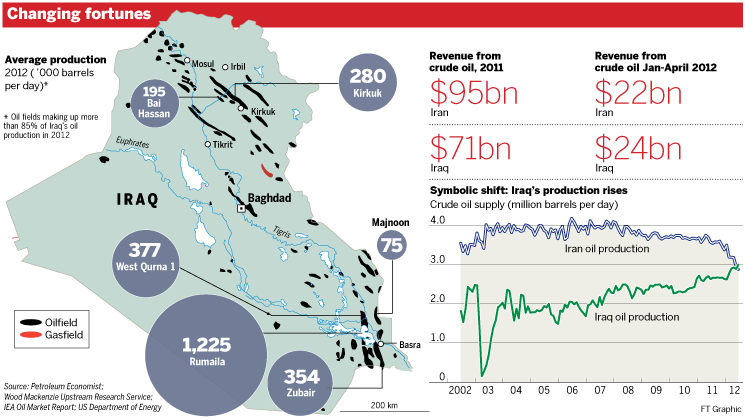Iraq at ten years
 Monday, March 25, 2013 at 12:35PM
Monday, March 25, 2013 at 12:35PM 
Cartoon found here (in an FT op-ed that fits this post nicely - if orthogonally).
Read through a variety of the tenth-year anniversary reviews, and I thought Thomas Friedman's was the best - despite the weird title (Democrats, Dragons or Drones?).
His basic notion that it takes the next generation to create and shape the subsequent reality is correct. Friedman pegs it at "9 months and 21 years to develop."
Fair enough. But the question (as he also notes) hinges on that generation's journey. Done well, it works. Done badly enough and a vicious spiral ensues. In truth, the jury remains out on that score.
We won the war - no doubt, and then took a pass on the postwar. If we hadn't, then questions of "why?" fade away. In the post-9/11 mood, America possessed the desire to reshape the region and Saddam was the obvious target. Direct causality was not the issue, although Dick Cheney tried to sell that. Nor was direct threat, referring to the late and frantic oversell of the WMD to Congress. The purpose - all along - was structural retribution: as in, you reshaped our world, now we reshape yours. Americans are just deeply uncomfortable admitting that, so we needed a clear and present storyline to drive our revenge-flick dynamics.
The resulting strategic "pre-emption" was oddly symmetrical in ambition but certainly not in cost (and why should it be so between a superpower and a non-state actor?).
So when we take that pass on the aftermath of the war, and basically pretend that what comes next doesn't really matter, we abort the entire regional restructuring ambition (which, if you remember, was on a nice roll for 2-3 years there) and we allow ourselves to be swallowed up (in terms of strategic effort and attention) by an insurgency that was completely foreseeable and completely manageable - if we had bothered to embrace that inevitability.
But instead of embracing it, we did what we always do and called the postwar another war. And wars yield a singular answer in US military history - called, more firepower. And then we found that made things worse (go figure).
And then the White House, chastened finally by the 2006 midterms, relabeled the conflict and rebranded the mission - and then we succeeded again.
But by then the public narrative had already been cast (Bush lied, too many deaths, too much cost).
So ultimately the Bush administration pays the legacy cost for its mistakes, which mostly had to do with stubbornness. They had their narrative of a successful war and stuck to it - until it hurt so bad that they had to change.
So what are we left with?
In structural terms, I like what the Middle East has become. The inevitabilities are being processed and Iran is more isolated than ever. And thanks to larger structural changes in the global economy, the area is coming under new superpower management - inexorably. None of it is nice, but it was never going to be anything but painful and violent. The Arab world has an enormous amount of catching up to do WRT globalization, and it will be awful in execution (and with Africa leaping ahead on many fronts, the Middle East and North Africa - or large portions of it - risk becoming globalization's long-term basket case).
If the US had handed off the region still encased in its many dictatorships, China would have a much easier time over the next two decades. Now, it faces challenges that are likely to alter its own political structure significantly - just like it did to the US. Some naturally see the "defeat of American empire" in the region, but since empire was never America's goal, that judgment is meaningless.
All that matters is the relative evolutions of the three superpowers of the 21st century: China, India and America.
America did, per my original Esquire piece, take strategic ownership of the Middle East in a big way. That ambition was both debilitating and liberating: we took our shot (badly) and now we're done "owning" things there (besides Iran's nukes). In that way, Iraq processed our inevitable post-9/11 over-reaching response (we are a democracy) and hurried us along the exhaustion-collapse-rock bottom-recovery-resurrection dynamic that was always slated for us in the post-Cold War world (our inability to handle the success of the "end of history" - aka, the globalization of our economic connectivity model). We had gotten used to running things, and we weren't going to stop until something made us stop - an unpleasant journey but a necesssary one.
Now, in grand structural terms, the race among my C-I-A trio is well underway. The Obama administration, needing a switch-over target, sells its Asian pivot. This is not a good answer, as I have noted frequently - but rather a red herring. The real struggle in Asia doesn't involve us except in an off-shore balancing role.
Instead, the real struggles of the future involve the very same frontier integration I've been talking about for a decade now. On that score, we are looking fine enough in our ongoing restructuring of our portfolio, while China's grows frighteningly larger relative to its ability to deliver and manage regions distant from its shores. India is just begining to recognize what responsibilities lie ahead.
You'll say that China will do it differently, but the structure of the system will force the same responses: China cannot afford to lose its growing overseas dependencies (much greater than any borne by the US), and so the responses will be mounted. And when they don't go well (whoever gets it right - right off the bat?), change will double back upon China - to its general benefit (along with the world's).
Iraq was always a means to an end (when in history has great power war ever been anything else?). During the real-time execution, it seems like everything - as does every war throughout history. But half a century later? It looks very different. It's a stepping stone for superpowers: some step up and some step down, some step away and some step in. None of it is exactly what it appears to be in the light of present-day reporting. Per Zhou Enlai's take on the French Revolution, we will be witnessing the downstream consequences across the century.
 China,
China,  India,
India,  Iraq,
Iraq,  Middle East,
Middle East,  US,
US,  globalization | in
globalization | in  Citation Post |
Citation Post |  Email Article |
Email Article |  Permalink |
Permalink |  Print Article
Print Article 
































